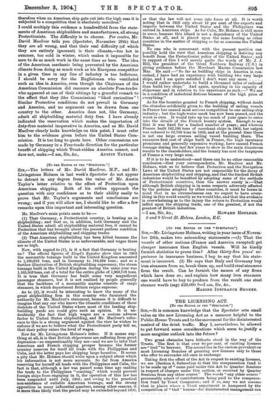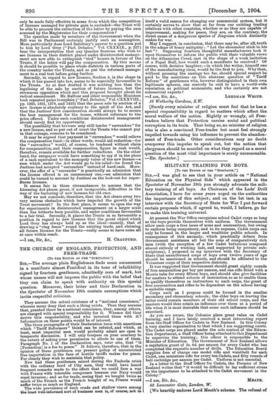more sanguine outlook into the future ?
Two great obstacles have hitherto stood in the way of the Trusts. The first is that over 80 per cent. of existing licenses are " tied" to brewers. The second lies in the custom prevalent on most Licensing Benches of granting new licenses only to those who offer to surrender old ones in exchange.
Taking first the effect of the Act in respect to existing licenses, we see (Section 3, Subsection 4) that the compensation fund is to be made up of "sums paid under this Act to Quarter Sessions in respect of 'charges under this section, or received by Quarter Sessions from any other source!' The words "any other source" presumably admit of contributions being paid to the compensa- tion fund by Trust Companies; and if so, may we not assume that in places where a Trust experiment is hampered by the competition of " tied" houses—for disinterested management can
only be made fully effective in areas from which the competition of licenses managed for private gain is excluded—the Trust will be able to procure the extinction of the latter by paying the sum assessed by the Magistrates for their compensation? The speeches made by members of the Government when the Bill was in Parliament certainly justify such an assumption. More particularly does Lord Salisbury's answer to a question put to him by Lord Grey ("Pan. Debates," Vol. CXXXIX., p. 227) bear the interpretation that any Quarter Sessions who wish to see licenses in their district placed under disinterested manage- ment are now able to extinguish "tied" houses in favour of the Trusts, if the latter will pay the compensation. By this means it should be possible to place whole districts in various parts of the country under the Trusts, and so put the reformed manage- ment to a real test before going further.
Secondly, in regard to new licenses, Section 4, in the shape in which it has passed into law, seems to be especially favourable to the Trusts. As at first drafted it was nothing less than the legalising of the sale by auction of future licenses, but the strenuous opposition which met this proposal brought about its radical amendment. Mr. Balfour and other responsible Ministers took repeated pains to explain (" Purl. Debates," Vol. CXXXVIII., pp. 1360, 1361, 1378, and 1413) that the quasi sale by auction of a new license is absolutely contrary to the spirit of the Act, and that the Justices' first consideration should always be to secure the best management for the house, without reference to the price offered. Under such conditions disinterested management should surely find its opportunity.
The possibility that brewers may still tender "surrenders" for a flew license, and so put out of court the Trusts who cannot pay in that coinage, remains to be considered.
It may be argued that payment in " surrenders " would relieve the compensation fund—in other words, would aid reduction—for the "surrenders" would, of course, be tendered without claim for compensation, and their compensation figure in cash would, therefore, remain available for further reductions. On the other hand, the ratepayer would have something to say if in the place of a cash equivalent to the monopoly value of the new license—a sum which under the Act would go to his relief—he found the Justices had accepted "surrenders" instead of hard cash. More- over, the offer of a " surrender " is practically an admission that the license offered is an unnecessary one,—an admission that could be turned to account by Justices on the look-out for super- fluous licenses.
It seems fair in these circumstances to assume that the Licensing Act places great, if not insuperable, difficulties in the way of the bartering of new licenses for old ones.
May we not concluded therefore, that the Act clears away two very serious obstacles which have impeded the growth of the Trust movement ? In the first place, it seems to open the way for experiments in disinterested management on a larger scale than has hitherto been possible, and under conditions favourable to a fair trial. Secondly, it places the Trusts in so favourable a position in regard to new licenses that the great object which Lord Grey has always held up as the ideal—namely, that of drawing a "ring fence" round the existing trade, and claiming all future licenses for the Trusts—really seems to have come all at once within reach.
—I am, Sir, &c., H. CRAUFURD.







































































 Previous page
Previous page